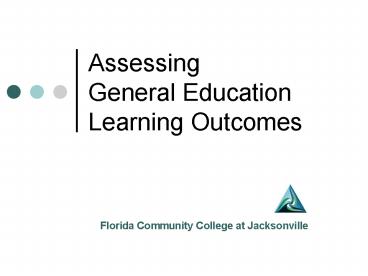Assessing General Education Learning Outcomes - PowerPoint PPT Presentation
1 / 23
Title:
Assessing General Education Learning Outcomes
Description:
... student learning...in order to inform decisions about how to improve learning. ... Review/interpret results, recommend strategies to improve student learning ... – PowerPoint PPT presentation
Number of Views:200
Avg rating:3.0/5.0
Title: Assessing General Education Learning Outcomes
1
Assessing General Education Learning Outcomes
Florida Community College at Jacksonville
2
Overview
- Definition of assessment
- Purposes of assessment
- Process and potential models
- Issues for the future
3
What Do We Mean By Assessment?
- Assessment of student learning can be defined as
the systematic collection of information about
student learningin order to inform decisions
about how to improve learning.
- Barbara Walvoord, Assessment Plain and Simple
4
Why assess?
- To gain useful information about student learning
that we can use as feedback to improve our
programs and services - To provide our accrediting organization with
evidence of student learning and program quality
5
Classroom ? Program
Feedback to Students
Evaluation by Instructor
Evidence of Student Learning (Assignments, Tests,
Papers)
Feedback to Instructor
Feedback to Faculty
Evaluation by Faculty Teams
Feedback to College
6
Typical Model
Determine learning outcomes to be assessed
Review/improve process
Map outcomes to curriculum
Adapt/develop/pilot assessment tools
Gather and compile results
Review/interpret results, recommend strategies to
improve student learning
Implement strategies
7
Models
- Curriculum-embedded assessment
- Develop rubrics for each of the institutions
core outcomes - Identify existing assignments that address each
outcome - Sample student work from these assignments
- Interdisciplinary faculty team scores the
assignments using the rubrics
8
Curriculum-embedded assessment Communication
Feedback to Students
Evaluation by Instructor using class rubric
Paper assigned in philosophy course
Feedback to Instructor
Feedback to Faculty
Evaluation by faculty teams using Communication
rubric
Feedback to College
9
Models
- Curriculum-embedded assessment
- Butler Community College
- Johnson County Community College
- Valencia Community College
- Brevard Community College
- Miami-Dade College
- Many othersthis is the most prevalent model
10
Models
- E-Portfolio
- Develop rubrics for each of the institutions
core outcomes - Identify existing assignments that address each
outcome - Ask students to submit their work to an online
portfolio site - Interdisciplinary faculty team scores the
assignments using the rubrics
11
Models
- E-Portfolio
- LaGuardia Community College
- Kapolei Community College
12
Models
- Summative Assessment/Capstone
- Design a special course or other required
experience, addressing one or more core outcomes - Implement a common assessment instrument or
rubric to gather data on student achievement of
outcome(s)
13
Models
- Summative Assessment/Capstone
- Mesa Community College
- Assessment Week students at a certain point
in their programs take common assessments during
their regular class times - Hillsborough Community College
- Integrative seminar faculty choose which three
core outcomes they want to address, and use
common rubrics to assess student work - Also uses MAPP as pre-post test
14
Where are we now?
- GER Learning Outcomes Knowledge Bases,
Intellectual Competencies, and Values - Course outlines that indicate which GER outcomes
are addressed - Team of Assessment Mentors to help guide us
15
General Education Outcome Categories CC System
Consensus
16
Choices
- How to gather results?
- Which model(s)?
- What tools?
- Which courses and/or sections?
- How to involve adjuncts?
17
More choices
- When to gather results?
- Each outcome every year, or rotate?
- Outcome priorities?
- At what point(s) in students program?
18
More choices
- How to review and interpret results?
- Who is involved, how, and when?
- What kind of support is needed?
- How are results compiled and shared?
- How will we use the results?
- When can we celebrate our accomplishments?
- How can we improve the process?
19
Concept or Implementation?
- Collect data and then never use it
- Measure things that are easy to measure
- Do assessment because we have to
- Collaborate to make sense of what we observe
- Gather useful evidence of what we believe is
important - Do assessment because it helps us and students
20
How to respond?
- I dont have time for one more thing
- Somehow, the results will be used against me
- Someone else is going to tell me how to teach
- Recognize that assessment is core to our practice
- Take control of the process
- Agree on what and how to assess at the program
level classroom practice is still up to the
individual
21
General Education Assessment website
- http//fccj.edu/campuses/mccs/instruction/liberal_
arts/genedassessment.html
22
You get what you assess so To get what we
value we must assess what we value
23
Room Assignments
- Communications B1204
- Humanities A1100
- Social Behavioral Sciences D1401
- Mathematics D1403
- Natural Sciences F1600































